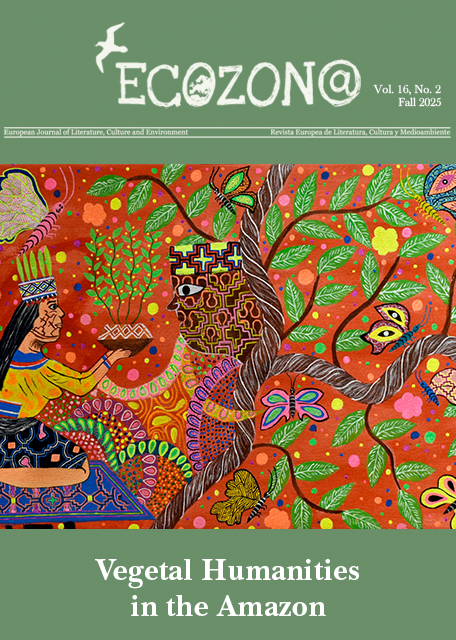<b>Within the Mainstream: An Ecocritical Framework for Digital Game History</b> // Dentro del canon: Un marco ecocrítico para la historia del videojuego digital
DOI:
https://doi.org/10.37536/ECOZONA.2017.8.2.1362Schlagworte:
Historiography, popular culture, entertainment, anthropomorphism, methodology, ethics, Red Dead Redemption, Dishonored // Historiografía, cultura popular, entretenimiento, antropomorfismo, metodología, ética, DishonoredAbstract
Ecocriticism of digital games has so far engaged with a rather small corpus of examples, predominantly from a prescriptive perspective and with a quite limited methodological toolkit. This essay systematizes and historicizes some of these commonly found limitations of past research and proposes methods for a more historically and generically diverse exploration of ecological thinking vis-à-vis digital games. The majority of discussions of games from an ecocritical perspective has applied concepts and frameworks borrowed from literature and film studies, thus privileging surface semiotics over game mechanics. More methodically aware studies have oriented themselves toward the popular framework of procedural rhetoric (Bogost 2007), resulting both in a selection bias towards serious games and an author-centric, intentionalist slant inherent in the approach. In general, the discussion revolves around a small number of games with apparent ecocritical potential, such as Myst (Cyan 1993) or Farmville (Zynga 2009), resulting in a selective, a-historic and therefore distorted discussion of ecology in the diverse medium of digital games. This essay discusses strategies for dealing with a larger corpus of digital games through a descriptive matrix for identifying and analyzing the ecological dimension of digital games. It proposes an extension of the ecocritical toolkit by including a more user-centered, ethics-based theoretical framework based on Sicart’s Ethics of Computer Games (2009). The gain of engaging with representation and simulation of the natural environment in mainstream computer game history will be demonstrated in an analysis of two paradigmatic games. In both Red Dead Redemption (Rockstar San Diego 2010) and Dishonored (Arkane Studios 2013), we encounter game design geared toward producing ludo-narrative dissonances which are highly inductive of critical engagement with the ecosphere.
Resumen
La ecocrítica de los juegos digitales se ha centrado en un corpus de ejemplos muy pequeño. Asimismo, la ecocrítica se ha basado en un número muy limitado de métodos. La mayor parte de los debates sobre juegos han utilizado conceptos y teorías tomados de la teoría literaria y el análisis cinematográfico, haciendo prevalecer por tanto análisis semióticos superficiales sobre el estudio de las mecánicas de juego. Los estudios que aplican métodos de game studies suelen estar basados en la teoría de retórica de procesos (Bogost, 2007), lo que acarrea una selección de ejemplos sesgada hacia los serious games y los juegos de autor. En general, estos debates se centran en un número pequeño de juegos con potencial ecocrítico, como Myst (Cyan 1993) o Farmville (Zynga 2009), lo que deriva en una discusión selectiva y ahistórica de la ecología en un medio tan diverso como los juegos digitales. Este artículo presenta estategias para analizar un corpus de juegos mayor. Este artículo propone una matriz descriptiva para identificar y analizar la dimensión ecológica de los juegos digitales. Metodológicamente, este artículo opera con una extensión de la teoría ecocrítica que incluye un marco teórico centrado en el usuario y basado en The Ethics of Computer Games (Sicart, 2009). Los beneficios de centrarse en la representación y simulación del medio natural en el canon de los juegos digitales serán demostrados a través del análisis de dos juegos paradigmáticos. Tanto Red Dead Redemption (Rockstar San Diego 2010) como Dishonored (Arkane Studios 2013) producen disonancias ludo-narrativas que promueven una relación crítica con la ecoesfera.
Downloads
Downloads
Veröffentlicht
Ausgabe
Rubrik
Lizenz
Authors who publish with this journal agree to the following terms:
a) Authors retain copyright and grant the journal right of first publication with the work simultaneously licensed under a Creative Commons Attribution License that allows others to share the work with an acknowledgement of the work's authorship and initial publication in this journal (CC BY-NC for articles and CC BY-NC-ND for creative work, unless author requests otherwise.
b) Authors are able to enter into separate, additional contractual arrangements for the non-exclusive distribution of the journal's published version of the work (e.g., post it to an institutional repository or publish it in a book), with an acknowledgement of its initial publication in this journal.
c) Authors are permitted and encouraged to post their work online (e.g., in institutional repositories or on their website) prior to and during the submission process, as it can lead to productive exchanges, as well as earlier and greater citation of published work (See The Effect of Open Access).










